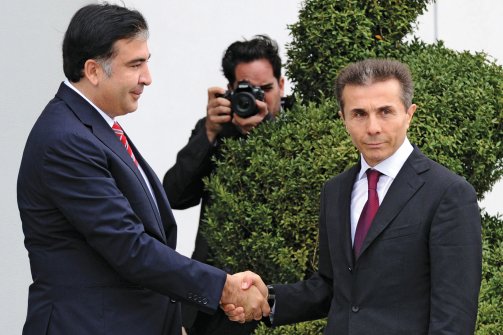
Ivanishvili’s Government Creates a Scapegoat, While Finding It Hard to Deliver on Its Promises
Publication: Eurasia Daily Monitor Volume: 10 Issue: 31
By:

On February 15, Georgian President Mikheil Saakashvili’s United National Movement (UNM) party, as part of a power-sharing agreement, confirmed its proposal to the ruling Georgian Dream (GD) coalition that a large part of the new constitutional provisions should go into effect now, instead of in October 2013, as originally envisioned (Rustavi 2, Imedi TV, February 15). The new Georgian constitution, which is scheduled to go into force in October, will transfer significant powers from the president to the prime minister, effectively turning Georgia into a parliamentary republic (For Georgian Constitution see, https://www.parliament.ge/index.php?option=com_content&view=article&id=180&Itemid=85&lang=en). A reduction of the president’s functions—and by extension the UNM’s political influence—can secure Prime Minister Bidzina Ivanishvili and the GD’s hold on power in the short term. However, this may not be entirely positive for them in the long term, taking into consideration existing political realities in the country.
Currently, the Georgian president holds strong constitutional powers, among them the authority to dismiss the parliament, as well as the government, and to appoint a new government without parliament’s consent. This particular clause has caused great anxiety for the GD-led government, which has perpetually feared its own dismissal. Subsequently, the GD pushed relentlessly to change this constitutional mandate (www.civil.ge, December 28, 2012; February 5, 6; also see EDM, February 14).
Besides holding significant constitutional powers, Saakashvili and the UNM still control the National Security Council, the Supreme Court, all regional governorships (appointed by the president) and a large number of local municipalities (www.iveroni.com.ge, www.geworld.ge, January 26). Moreover, the UNM, despite the defections of nine of its members in parliament (www.newspress.ge, February 5), still holds 56 seats out of a total of 150.
On the one hand, President Saakashvili’s formidable constitutional powers and the UNM’s still strong political position were able to challenge the GD’s total grip on power. On the other hand, this reality conveniently allowed the GD to continuously portray Georgia’s current political situation as a rule of “two governments.” In other words, the ruling coalition argued that in addition to the GD-led government, the president and his team also try to govern the country on their own, or at least manage to hamper the GD and its policies. On numerous occasions, the Georgian prime minister and various government officials blamed the president and the UNM for obstructionism, a deliberate destabilization of the political situation and sabotage of the government’s work (for instance, see Kviris Palitra, February 1; 24 Saati, February 2). The highly confrontational co-habitation that developed in Georgia was exacerbated by a wide array of issues, ranging from the arrests of high-ranking Saakashvili-era officials, a standoff in the parliament over constitutional changes, clashes in regional municipalities between UNM and GD representatives, as well as foreign policy issues. And all of these points of contention served as suitable evidence to back up the GD-offered version of political developments in Georgia.
The narrative of “two governments” is quite handy for the Georgian Dream coalition as it increasingly finds it difficult, and even unfeasible, to deliver on its unrealistic pre-election campaign promises to its constituency, especially those addressing Georgia’s most pressing problems. Of particular concern socially and politically are massive impoverishment and widespread unemployment, which by the latest available official estimates stands at 15 percent (https://geostat.ge/index.php?action=page&p_id=146&lang=eng), but according to some unofficial sources may be many times higher.
So far, the GD has been successfully in using the president and the UNM as a shield to protect itself from public criticism for its shortcomings and failings. Georgian society—which does not have much, if any, political experience with a system of co-habitation between a president and a prime minister—readily accepted the GD-offered narrative, which claims that the president and his UNM party are sabotaging the new government’s efforts to govern effectively and implement a broad range of policies. Widespread and often firm expectations exist within the society that once President Saakshvili’s term in office expires and the UNM’s last holdouts on executive power are gone, life will get better in the country. However, the first signs are appearing that such a narrative may be starting to erode. On February 16, during the Georgian Dream–Democratic Georgia (GDDG) party congress, a large group of people protested outside of the Tbilisi Event Hall where the political gathering was taking place. The protesters demanded that the GD fulfill its pre-election promises and help them in their quest to legalize the ownership of their long-disputed apartments (www.geo.palitratv.ge, www.netgazeti.ge, February 16). Evidence is also mounting that public disappointment with the GD-led government is widening throughout the country.
The UNM-held presidency has, moreover, unintentionally contributed to forcing the GD coalition to remain united (at least on the surface) in order to avert the opposition’s possible attempt to return to power. Paradoxically, therefore, the UNM remains the single strongest uniting factor for the GD, which is ridden with internal disagreements that are ready to transform into open conflict and the possible disintegration of the coalition (www.interpsessnews.ge, January 4; www.civil.ge, January 23; see EDM, January 17).
The GD majority in the parliament as well as Prime Minister Ivanishvili quickly hailed the UNM’s February 15 proposal to put into force the new Georgian constitution and limit the president’s powers ahead of October (Georgian Public Broadcaster, Info 9, February 16). However, if these constitutional changes go into effect now and the president’s powers are limited, Ivanishvili and his government may find it harder to portray Saakashvili and the UNM as an alternative pole of power and subsequently blame it for all the GD’s shortcomings. Even if Ivanishvili’s ruling coalition manages to maintain such a narrative, it will find it impossible to uphold it as of October 2013 when President Saakashvili’s term in office expires and the last remnants of the UNM’s executive power are gone. Hence, the GD will have no one to blame for its failings and will find itself directly responsible to the public. Subsequently, widespread popular disappointment with the GD and the disintegration of the coalition may be unavoidable.




